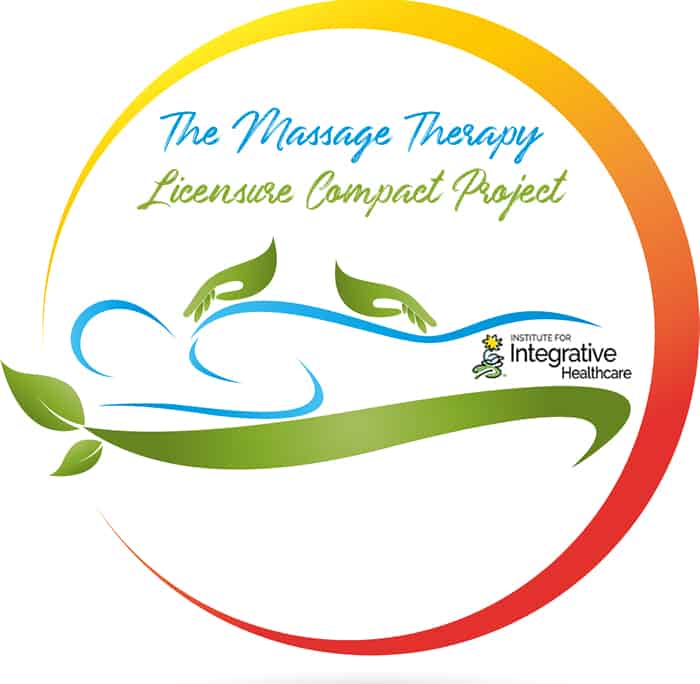

Many massage therapists inquire if a national licensure exists. Unfortunately, there is no true national licensure in our profession.
Several years ago, the National Certification Board of Therapeutic Massage and Bodywork (NCBTMB) changed their licensure exam title to “Board Certification Exam” (BCE) to better provide clarity that their exam yields a board certification designation not to be confused with true national licensure in all fifty states. Currently, 46 states choose whether to accept NCBTMB’s exam and/or the Massage and Bodywork Licensing Exam (MBLEx) created by the Federation of State Massage Boards (FSMTB) regarding massage therapy licensure requirements.
True National Licensure and Portability
Recently, a unique effort was undertaken to provide an alternate means towards achieving true national licensure and portability for our profession. The Massage Therapy Licensure Compact Project is being facilitated by the Council for State Governments (CSG). Additional information on this project can be found at their website at: https://compacts.csg.org/.
This initiative is underway, and the Technical Assistance Group has already held several meetings to develop specific developmental recommendations that will be utilized by the Document Drafting Team to include within federal legislation. The current goal is for proposed legislation to be available for public comment by spring 2022.
In collaboration with the Department of Defense, CSG administered a competitive proposal process from eligible applicants including professional associations, associations or federations of state licensing boards, a coalition of state licensing boards, or national credentialing bodies for professions that are licensed in at least 30 states. Each profession was selected based on the merits of their proposal.
Occupational Licensing Interstate Compacts
Occupational licensing interstate compacts allow professionals in licensed occupations to transcend state boundaries by creating uniform standards of practice. These compacts will support professionals in state-licensed occupations including military spouses.
The goals of these compacts are as follows:
- Streamline relicensing between member states of the compact for all practitioners in the occupation
- Support spouses of relocating active-duty military personnel through provisions recognizing unique requirements of military life
- Create streamlined pathways for interstate practice
- Increase public access to care or services
- Enhance the states’ ability to protect the public’s health and safety
- Encourage the cooperation of compact member states in regulating multistate practice
- Maximize state membership
- Enhance the exchange of licensure, investigative, and disciplinary information by means of compact commission database
Three Phases
There will be three phases of the Massage Therapy Compact Project as work by CSG develops.

- Phase 1 entails developing technical assistance groups, convene document writing teams and distribute initial licensure compact language for stakeholder review.
- Phase 2 will witness the dissemination of phase 1 documents to state agencies and boards, planning a national legislative briefing and create a resource kit for the compact.
- Phase 3 will oversee the transition and operation of approved compact provisions.
On May 13, 2021, the Council of State Governments hosted a virtual meeting to explain the Massage Therapy Interstate Compact Project. Recognizing both the significance and complexity of massage therapy licensure, CSG gathered a team of state leaders and general public members from massage therapy community to discuss the background and importance of this project.
6 Highlights From This Meeting
- Military families move on average every three years. This creates a circumstance in which a massage therapist as a member of a military family will maintain multiple state licenses concurrently. Portability for their licenses would help immensely with their ability to work and provide for their families.
- A goal is to maintain balance so that states do not lose sovereignty over their individual licensure requirement processes yet work in collaboration with other states to support portability efforts.
- An interstate compact is defined as a legal contract between two or more states providing the means to cooperatively address shared problems and respond to national priorities with one voice.
- The CSG has enacted 149 pieces of compact legislation for nine other health related professions since 2016 showing how active this organization is capable of achieving action intentionally.
- Top benefits of Occupational Licensure Compacts: increased mobility, leverage advanced technology, support relocating military members and their families, utilization of shared data systems, agreement on uniform requirements and increasing access to highly qualified professionals, especially in areas where licensure requirement lie below other states.
- States will witness a strengthening of labor markets, take advantage of “best practices” by all states, and flexibility and autonomy in comparison to any future federal policies.
Ultimate Goal of This Project
The ultimate goal of this project is to actualize the dream of our profession: true license portability amongst our fifty states.
This will assist massage therapists make life transitions much easier to provide for one’s family when they move to a new state. The FSMTB is committed to seeing this project to fruition displaying to CSG an ability to create partnerships within its jurisdictions and sustain compact operations.











